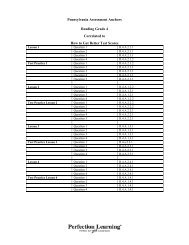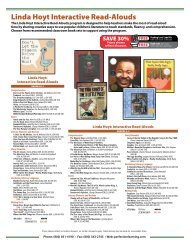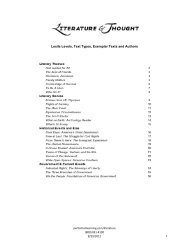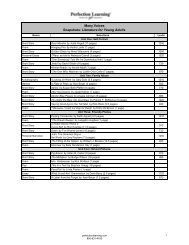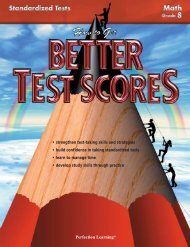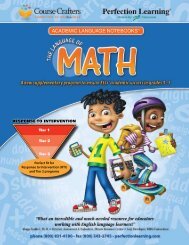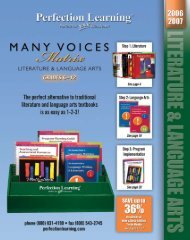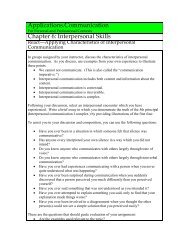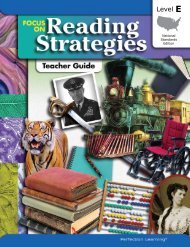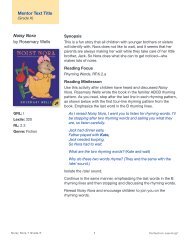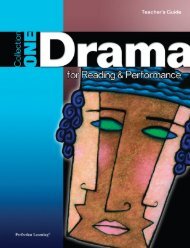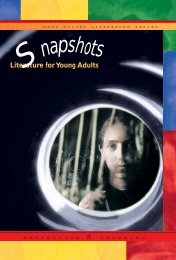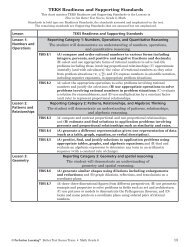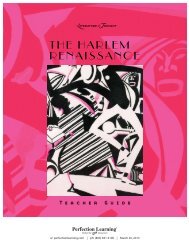Florida Sunshine State Standards (Grade 12) - Perfection Learning
Florida Sunshine State Standards (Grade 12) - Perfection Learning
Florida Sunshine State Standards (Grade 12) - Perfection Learning
You also want an ePaper? Increase the reach of your titles
YUMPU automatically turns print PDFs into web optimized ePapers that Google loves.
Essential Guide to Language, Writing, and Literature, Blue Level / <strong>Florida</strong> <strong>Sunshine</strong> <strong>State</strong> <strong>Standards</strong> Correlation - p. 7<br />
Standard<br />
LA.11<strong>12</strong>.4.1.1 The student will write in a variety of expressive<br />
and reflective forms with an engaging plot that use a<br />
range of appropriate strategies and specific narrative<br />
techniques (e.g., dialogue, internal monologue, point of<br />
view), employ literary devices (e.g., irony, conceit, imagery,<br />
flashback, foreshadowing, symbolism, allusion), and<br />
sensory description.<br />
LA.11<strong>12</strong>.4.1.2 The student will write in a variety of expressive<br />
and reflective forms to incorporate figurative language,<br />
emotions, gestures, rhythm, dialogue, characterization, plot,<br />
and appropriate format.<br />
LA.11<strong>12</strong>.4.3.1 The student will write in a variety of<br />
informational/expository forms, including documents using<br />
precise technical and scientific vocabulary (e.g., manuals,<br />
procedures, directions).<br />
LA.11<strong>12</strong>.4.3.6 The student will write a work-related document<br />
(e.g., application, resume, meeting minutes, memo, cover<br />
letter, letter of application, speaker introduction, letter of<br />
recommendation).<br />
LA.11<strong>12</strong>.4.4.1 The student will write persuasive compositions<br />
(e.g., speech, editorial, letter to the editor, public service<br />
announcement) that will state a position or claim,<br />
presents detailed evidence, examples, and reasoning to<br />
support effective arguments and emotional appeals, and<br />
acknowledges and refutes opposing arguments.<br />
LA.11<strong>12</strong>.4.4.2 The student will write persuasive compositions<br />
(e.g., speech, editorial, letter to the editor, public service<br />
announcement) that include persuasive techniques (e.g.,<br />
word choice, repetition, emotional appeal, hyperbole, appeal<br />
to authority, celebrity endorsement, rhetorical question,<br />
irony, symbols, glittering generalities, card stacking,<br />
testimonials, bandwagon, image association, transfer).<br />
LA.11<strong>12</strong>.4.4.5 The student will write persuasive compositions<br />
(e.g., speech, editorial, letter to the editor, public service<br />
announcement) that attribute sources of information when<br />
appropriate.<br />
LA.11<strong>12</strong>.5.2.1 The student will demonstrate effective<br />
listening skills and behaviors for a variety of purposes, and<br />
demonstrate understanding by critically evaluating and<br />
analyzing oral presentations.<br />
Chapter(s)<br />
Chapter 15 Writing Strong Sentences<br />
Chapter 18 Personal Writing<br />
Chapter 22 Creative Writing<br />
Chapter 15 Writing Strong Sentences<br />
Chapter 22 Creative Writing<br />
Chapter 14 The Six Traits of Good Writing<br />
Chapter 19 Expository Writing<br />
Chapter 28 Vocabulary Power<br />
Chapter 24 Communication for College<br />
Chapter 25 Communication for the World of<br />
Work<br />
Chapter 14 The Six Traits of Good Writing<br />
Chapter 20 Persuasive Writing<br />
Chapter 29 Critical Thinking<br />
Chapter 14 The Six Traits of Good Writing<br />
Chapter 20 Persuasive Writing<br />
Chapter 29 Critical Thinking<br />
Chapter 14 The Six Traits of Good Writing<br />
Chapter 20 Persuasive Writing<br />
Chapter 29 Critical Thinking<br />
Chapter 29 Critical Thinking



